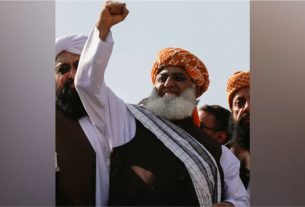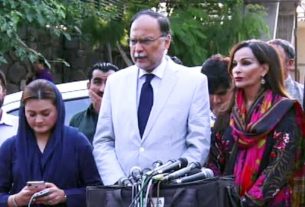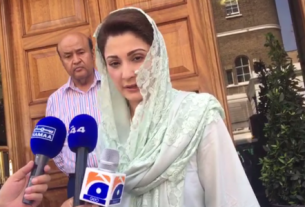ISLAMABAD: Chief Justice of Pakistan (CJP) Qazi Faez Isa on Monday said that the Supreme Court is currently looking at one person’s honour and seeking to fix the history “as it wants to set a better example” in a presidential reference pertaining to a death sentence awarded to former premier Zulfikar Ali Bhutto.
The CJP made these remarks during the hearing of the presidential reference seeking to review the death sentence awarded to the Pakistan Peoples Party (PPP) founder.
The apex court larger bench — led by CJP Isa and comprising Justice Sardar Tariq Masood, Justice Syed Mansoor Ali Shah, Justice Yahya Afridi, Justice Amin-ud-Din Khan, Justice Jamal Khan Mandokhel, Justice Muhammad Ali Mazhar, Justice Syed Hasan Azhar Rizvi and Justice Musarrat Hilali — resumed hearing of the presidential reference seeking to revisit the 1979 “controversial” death sentence.
Bhutto was hanged to death on April 4, 1979, in the Rawalpindi district jail in a murder case. His party, however, termed the capital punishment to Bhutto as “judicial murder”.
Former president Asif Ali Zardari, on April 2, 2011, approached the apex court through a presidential reference under Article 186 of the Constitution to seek its opinion on revisiting the trial of the Pakistan Peoples Party (PPP) founder.
During the previous hearing on December 12, 2023, Justice Mansoor raised questions over the presidential reference. The SC judge sought assistance in determining the questions of law, observing that the court had already dismissed the appeal against its verdict which had also achieved the finality.
“The Supreme Court can’t hear another appeal on the matter. How can we rehear the matter that had been closed?”
The court proceedings of the reference were broadcast live on the official website and the YouTube channel of the Supreme Court.
Today’s hearing
At the outset of the hearing, PPP leader Senator Raza Rabbani came to the rostrum.
“Are you an amicus curiae?” questioned CJP Isa. To this, Rabbani said he was representing Sanam Bhutto, Bakhtawar Bhutto and Asifa Bhutto in the case, adding that he has submitted a petition to become a party in the case.
Meanwhile, Zahid Ibrahim, said he was representing Zulfikar Bhutto Jr and Fatima Bhutto.
Amicus curiae Makhdoom Ali Khan then began his arguments, saying that the chief justice had sought the transcript of an interview in the same case.
At this, Justice Mazhar said that this reference was based on the interview of former judge Justice (retd) Naseem Hasan Shah.
Justice Shah said that the top court cannot decide on the case just by watching an interview. “The court can only give an opinion on legal questions under Article 186,” he added.
At this, Makhdoom said that the question is not about Bhutto’s execution but about the stain on his character. “Later, one of the judges said in an interview that he gave the verdict under pressure,” he said.
After this, the court played the interview of Justice (retd) Shah’s interview.
Justice Shah said that only one of the judges gave an interview while others — who were a part of the bench — remained quiet.
Justice Shah remarked that the only point is that the judiciary was not independent at that time.
Justice Afridi then said that a single interview could not decide that the judiciary was not independent at that time. “There were other judges who wrote their notes and dissented,” he added.
At this, the CJP highlighted that the ratio of the bench in Bhutto’s case was such that the opinion of one judge was also important.
Makhdoom then compared the reference to Samiullah Baloch case, saying the judge who wrote the verdict withdrew his decision. He said that the court should reexamine the case if it believes justice was “massacred”.
Later, Justice Hilali said that the court needs to fix the history as this “black spot” is not only on a person’s character but also on some institutions.
The apex court then adjourned the hearing till the third week of February keeping in view the upcoming general elections.



